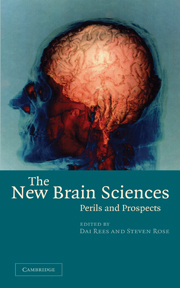Book contents
- Frontmatter
- Contents
- List of contributors
- Part I Introduction: the new brain sciences
- Part II Freedom to change
- Part III Neuroscience and the law
- Part IV Stewardship of the new brain sciences
- 10 The neurosciences: the danger that we will think that we have understood it all
- 11 On dissecting the genetic basis of behaviour and intelligence
- 12 Prospects and perils of stem cell repair of the central nervous system: a brief guide to current science
- 13 The use of human embryonic stem cells for research: an ethical evaluation
- 14 The Prozac story
- 15 Psychopharmacology at the interface between the market and the new biology
- 16 Education in the age of Ritalin
- Part V Conclusion
- References
- Index
14 - The Prozac story
Published online by Cambridge University Press: 08 August 2009
- Frontmatter
- Contents
- List of contributors
- Part I Introduction: the new brain sciences
- Part II Freedom to change
- Part III Neuroscience and the law
- Part IV Stewardship of the new brain sciences
- 10 The neurosciences: the danger that we will think that we have understood it all
- 11 On dissecting the genetic basis of behaviour and intelligence
- 12 Prospects and perils of stem cell repair of the central nervous system: a brief guide to current science
- 13 The use of human embryonic stem cells for research: an ethical evaluation
- 14 The Prozac story
- 15 Psychopharmacology at the interface between the market and the new biology
- 16 Education in the age of Ritalin
- Part V Conclusion
- References
- Index
Summary
My theme is how ideas in neuroscience – laboratory work, theory and seminar room discussions – land in our communities via pharmaceutical promotions, the media, print journalism and litigation; and how there is growing gulf between commonsense notions of responsibility, and a medicalised model of criminal behaviour.
In 1994 I was commissioned by a newspaper to investigate a case that connected a suicidal killer, the drug Prozac and a civil action for liability. Over a period of twelve weeks I attended a trial, in the United States, that involved arguments about impulse control, free will, the action of brain chemistry on human behaviour and, because the arguments were presented, public misunderstanding of current science (Cornwell, 1996).
On 14 September 1989, Joe Wesbecker, a forty-seven-year-old pressman returned to the printing factory Standard Gravure, his former place of work in Louisville, Kentucky, and shot twenty of his co-workers, killing eight, before committing suicide in front of the pressroom supervisor's office. It was discovered soon afterward that Wesbecker had been taking a course of the antidepressant Prozac. Thus Eli Lilly of Indianapolis, the manufacturer and distributor of the drug, became a prime target in a subsequent liability suit brought by the survivors and relatives of the dead. According to his psychiatrist, Dr Lee Coleman of Louisville, Wesbecker had been prescribed Prozac to alleviate depression related to workplace stress and his complaints of continuing unfair treatment by the management at Standard Gravure.
- Type
- Chapter
- Information
- The New Brain SciencesPerils and Prospects, pp. 223 - 231Publisher: Cambridge University PressPrint publication year: 2004



